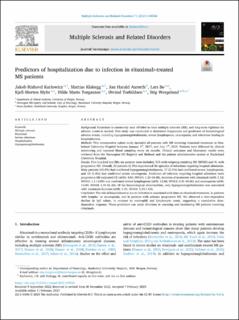| dc.description.abstract | Background: Rituximab is extensively used off-label to treat multiple sclerosis (MS), and long-term vigilance for adverse events is needed. This study was conducted to determine frequencies and predictors of hematological adverse events, including hypogammaglobulinemia, severe lymphopenia, neutropenia, and infections leading to hospitalization.
Methods: This retrospective cohort study included all patients with MS initiating rituximab treatment at Haukeland University Hospital between January 1st, 2017, and July 1st, 2021. Patients were followed by clinical monitoring and repeated blood sampling every six months. Clinical outcomes and laboratory results were retrieved from the Norwegian MS Registry and Biobank and the patient administrative system at Haukeland University Hospital.
Results: Five hundred and fifty-six patients were included, 515 with relapsing-remitting MS (RRMS) and 41 with progressive MS. Overall, 33 patients (5.9%) experienced 56 episodes of infections requiring hospital admission. Sixty patients (10.8%) had confirmed hypogammaglobulinemia, 17 (3.1%) had confirmed severe lymphopenia, and 10 (1.8%) had confirmed severe neutropenia. Predictors of infection requiring hospital admission were progressive MS (adjusted OR (aOR): 4.81; 95%CI: 1.25-18.48), duration of treatment with rituximab (aOR: 1.52; 95%CI: 1.11-2.09) and confirmed severe lymphopenia (aOR: 13.58; 95%CI: 3.41-54.06) and neutropenia (aOR: 13.40; 95%CI: 2.93-61.25). Of the hematological abnormalities, only hypogammaglobulinemia was associated with treatment duration (aOR: 1.35; 95%CI: 1.09-1.69).
Conclusion: The risk of hospitalization due to infection is associated with time on rituximab treatment, in patients with lympho- or neutropenia, and in patients with primary progressive MS. We observed a time-dependent decline in IgG values, in contrast to neutrophil and lymphocyte count, suggesting a cumulative dose-dependent response. These predictors can assist clinicians in assessing and monitoring MS patients receiving rituximab. | en_US |

